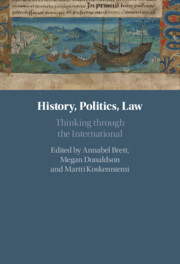Book contents
- History, Politics, Law
- History, Politics, Law
- Copyright page
- Contents
- Acknowledgments
- Notes on Contributors
- Introduction History, Politics, Law
- Part I Methods, Approaches and Encounters
- Part II Thinking through the International
- Law and Constructions of the Political
- 5 Carl Schmitt’s International Thought and the State
- 6 Carl Schmitt on the Theory and Practice of Occupation and Dictatorship
- Empires, States and Nations
- Institutions and Persons
- Economics and Innovation
- Gender
- Index
5 - Carl Schmitt’s International Thought and the State
from Law and Constructions of the Political
Published online by Cambridge University Press: 28 September 2021
- History, Politics, Law
- History, Politics, Law
- Copyright page
- Contents
- Acknowledgments
- Notes on Contributors
- Introduction History, Politics, Law
- Part I Methods, Approaches and Encounters
- Part II Thinking through the International
- Law and Constructions of the Political
- 5 Carl Schmitt’s International Thought and the State
- 6 Carl Schmitt on the Theory and Practice of Occupation and Dictatorship
- Empires, States and Nations
- Institutions and Persons
- Economics and Innovation
- Gender
- Index
Summary
On 21 April 1947, in a Nuremberg interrogation cell, two seasoned German lawyers assessed the merits of political thought for international law. At stake was a death sentence. On one side was Robert Kempner, a former chief legal adviser to the Prussian police, whose botched attempt to outlaw the Nazi party had brought him minor prominence in the early 1930s.1 After losing his position and citizenship to Nazi racial laws, Kempner, like many Jewish civil servants, had fled Germany’s increasingly hostile conditions. After four years in Italy, Kempner reached the United States in 1939, and there found employment at the Justice Department, before being dispatched back to Germany in the aftermath of the Second World War. Sitting opposite Kempner was Carl Schmitt, a public law professor2 who had once been lampooned as the ‘notorious weather vane on the roof of the Third Reich’.3 Others saw in Schmitt ‘Hitler’s key man’, the ‘leading international lawyer in Germany’, ‘the Nazi expert on constitutional law’,4 and, in a characterisation betraying at least some convulsion of phobic attachment, ‘perhaps the greatest authority on the Nazi theory of the state’.5 Still others, like the Schutzstaffel’s weekly magazine Das Schwarze Korps, wrathfully condemned Schmitt for ‘falsifying history’ and cheering for a slinking Catholicism that threatened to corrode the foundations of the Third Reich.6 The US Chief Counsel for War Crimes had tasked Kempner with evaluating whether Schmitt’s academic texts, particularly his theorisation of space and his combative understanding of politics, warranted a full-blown charge before the Nuremberg Military Tribunal – a special court set up for German war criminals, who, while part of the wider National Socialist project, missed the cut to be brought before the International Military Tribunal’s great chamber.7
- Type
- Chapter
- Information
- History, Politics, LawThinking through the International, pp. 131 - 159Publisher: Cambridge University PressPrint publication year: 2021



